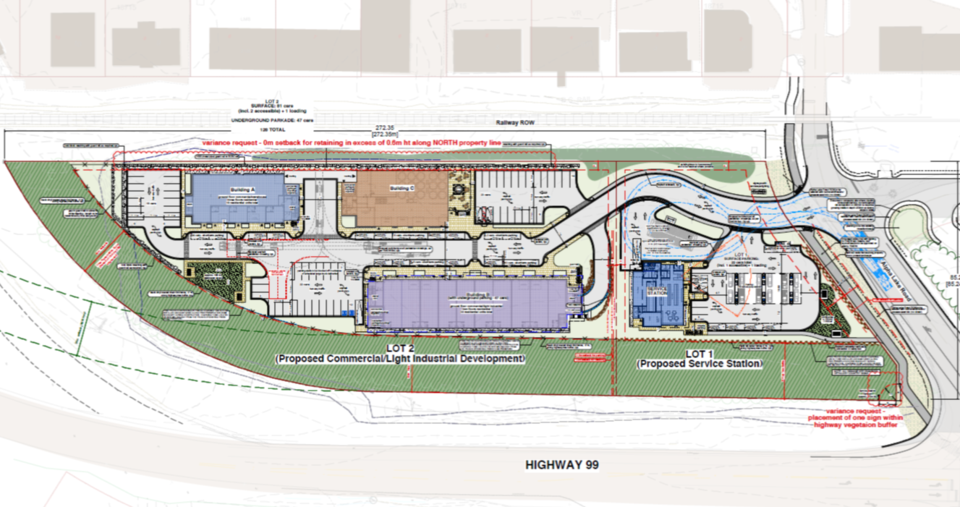A Lil’wat Nation development in Function Junction that received conditional approval from the Resort Municipality of Whistler (RMOW) way back in 2017 is finally set to move ahead after receiving provisional approval from the province.
The land in question, just off Highway 99 at the entrance to Function Junction, is owned by the Lil’wat Nation through the Legacy Land Agreement of the 2010 Olympic and Paralympic Winter Games.
One of the conditions set by the RMOW in 2017 was that the Lil’wat receive approval from the provincial Ministry of Transportation and Infrastructure (MOTI) regarding planned improvements to what is already a very busy intersection at the entrance to Function.
“I don’t think it’s a surprise to anyone to know that that intersection has some existing challenges,” said Lil’wat Nation chief administrative officer Kerry Mehaffey.
A traffic study conducted by the Lil’wat Nation concluded the development would generate about a five-per-cent increase in traffic, Mehaffey said, though he declined to share the study when Pique asked; a Freedom of Information request for the study submitted by Pique in 2018 was also denied (see “Lil’wat looks to break ground in Function, but where’s the traffic study?” Pique, April 3, 2019).
The Lil’wat will be responsible for the roadway improvement costs associated with the development.
Mehaffey said the Lil’wat and MOTI have agreed on a realignment of Lynham Road to create a new four-way intersection, and an extension of the right-hand turn lane accessing Highway 99 heading southbound.
The extended right-hand turn will feature an acceleration lane rather than the yield sign currently in place.
“So we’re hoping that people will essentially be able to—if there’s traffic coming out of our site turning right, which we think a significant portion of the gas station traffic, for example, will be southbound—they would be able to get back onto the highway without getting into the line of cars, or impeding the line of cars trying to go straight or left, which was a big one,” Mehaffey said.
The roadwork proposed in the original 2017 report to council pondered more significant changes, including widening Alpha Lake Road to include a dedicated left-turn lane and a second eastbound through-lane towards the highway, and adding a second northbound through-lane and eastbound turn-lane at the Highway 99 and Alpha Lake Road intersection.
In the end, the Lil’wat and MOTI settled on “a series of incremental changes, as opposed to a significant change to the intersection,” Mehaffey said, adding that the Nation is hoping to begin construction as soon as possible.
“So we are working on the remaining outstanding development permit items, and hope to get those done in short time, [as well as the] tender works, and maybe [begin construction] as soon as late summer, fall” he said.
Outstanding conditions include supplying a letter of credit for all the onsite and offsite landscaping and servicing works that need to be completed, and a finalized agreement that will hold the Lil’wat responsible for maintenance of landscaping between the Valley Trail and the edge of its property.
Though no tenants have signed on yet, plans for the 2.15-hectare site include a gas station and three mixed-use buildings containing office and commercial space, as well as 48 units of employee-restricted rental housing.
The Retail Operations branch of the Lil’wat Business Group, which also operates the recently opened gas station in Mount Currie, will manage the gas station.
The project has long been a priority for the Lil’wat, which sees many positives in the development, Mehaffey said.
“I think for a lot of [Lil’wat Nation members] it’s really another opportunity for them to demonstrate their presence in Whistler, how long they’ve been there, and to sort of make a mark on the community,” Mehaffey said, adding that the project will also be a revenue generator, “and a way for us to deliver better programs and services directly into the community.”
Pique reached out to MOTI for further details on April 30, but did not receive a response before press time.
The RMOW was unable to provide an interview or any information about the project, as it is still dealing with the effects of a ransomware attack that took all municipal services offline for more than a week.




